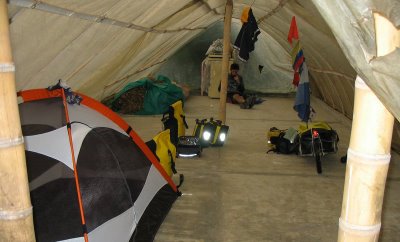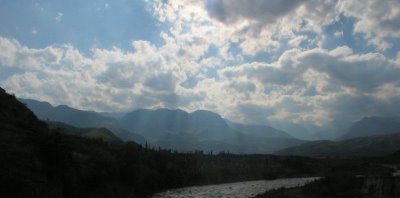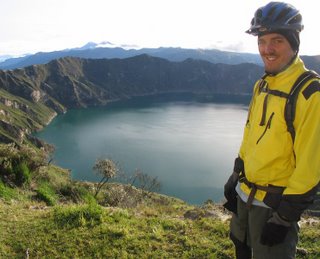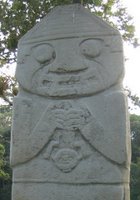Felt Hats and Feathers

Squirriling down a sandy, twisting ribbon of road, every turn brings you to a vast new valley, vertical walls of impossible green thousands of feet down, draped in a patchwork quilt of pastures and farms wherever the walls are not so steep as to send it slipping into the river. You see a cloud racing across the expanse and know that you will be engulfed. You pull on your jacket, and the world fades to icy white. But you're dropping twenty meters per minute, and it's not long before you break through the ceiling like a glider on final approach. The valley spreads before you again, now pierced through with columns of brilliance where the clouds have not yet gathered. You feel like you're cheating, floating without effort through this massive and impenetrable beauty.

You are cheating, for thousands spent decades with donkeys, tractors, pick-axes, and dynamite stretching this ribbon along these walls.

But also you're not, for you started at the sea.

The Ecuadorians, draped in their blue wool ponchos and wearing their green felt hats, towing their donkeys and cows, working their farms, and tending their shops, are of mixed opinion. Most of them wave, smile, stare, and want to know where you have come from and where you are going. "Vaya bien!" they say, proud that you are enjoying their country. This alone makes the trip worth it, knowing that you made someone smile and gave them something interesting to talk about at dinner. Others barely seem to notice. This is nice too, knowing that these are content enough in their own life that some gringo on a bike does not upset things. Then there are those who ask "But why? It would cost so much money!" This is a fair question.

Please let me parenthetically mention that Ecuador has cities and towns full of men in pressed suits, girls in Abercrombie, cell phones, computers, and Toyotas. I don't intend to put them all into ponchos and felt hats. But on a bike, one does tend to pass through the cities rather quickly and dwell in the countryside for quite some time. As a result, a great many of the Ecuadorians I have met have been wearing felt hats, some with a feather. Those are my favorite, with a feather. Man, if I could pull that off in the States...

For all you truckers out there, who dwarf our lust for this open road, who circle the globe with longer strides, who climb these peaks with fewer gears, who know these passes as your own, who occupy this land, who rule it, yet who in all your glory love us still, who have taken us as your own, and who blow your horns in our honor, who sound your trumpets in our salute, we thank you! Also, we beg you, please stop! It scares the amoebas out of us, and it hurts our ears!

The stats: 2500km down! Average per full cycling day: anywhere from 50 to 100km, depending on terrain. (The original idea of 120 per day is out the window, along with the penguins! Alas, another day.) Number of flat tires: 1. Number of blown pedal bearings: 2. Equator: crossed.

In Colombia, we moved between 0 and 9000 feet in elevation. Here in Ecuador, we're hanging out between 8000 and 12000. (It's cold!) Peru is next, where we will go back to 0, and maybe swimming in the ocean, then up to 15000+. On roads! That's pretty high, folks. Three miles straight up. It's gonna be freezing! For those unfamiliar with such numbers, consider that the highest PEAKS in Colorado are in the mid 14's. The passes that the roads traverse are thousands less.

I'll be honest. At first I didn't like the climbing. It hurt. The only good thing about climbing was that It meant I got to descend. But slowly the two are evening out, and it may be that one day I begin to prefer climbing. The thing is, when you are decending, you get to go fast, and I do love a thrill. But going fast means all your concentration, all your senses, all your muscles, all your ligaments and toes are trained on the road. I mean, if you're bombing a hill on a hundred pound unsuspended bike at 60 km/hr, you gotta look where you're going. That's the only thing that matters. You're tense, you get stiff and cold and tight. And you know that going down means it won't be long before you gotta start lugging those stiff cold legs back uphill again.

But there really is something wonderful about chuging up a mountain at 6 km/hr, taking a bite out of that mountain with each stroke of your crank, settling into your pace and holding it for hours or days, with nothing to occupy your mind other than donkeys and clouds and a cute girl in a felt hat tending her sheep. And then of course there is all the while in the back of your mind that trite little truism, "what goes up, must come down!" It's getting to where a day at 6 km/hr for an hour at 60 seems like a pretty fair trade.

This is Ari Giron and Alex Dorado, of Rosas, Columbia. They enthusiastically hosted us in their front yard one night, and fed us rice and beef, and tea from some leaf that tastes like lemon grass. When Ari learned I am a mechanical engineer, he spent an hour showing me pictures of machine parts that his son, a machinist, had produced for a factory in Cali. Alex has just finished two years in the military (he was proud to tell me that he had killed guerillas). He now grows bananas and works for the Colombian census.

I watched bull fighting on the television for the first time the other day. I know that this is a big tradition and everything, and I don't want to hurt anybody's feelings, but this was just about the sorriest thing I have ever seen. It was basically three men, dressed in worsted wool and gold braid, taunting a bull with red cloths, and sticking knives into its back like little boys nailing frogs to a tree. When they tired of this, they brought out a blindfolded horse dressed in a red and yellow coat, and the stadium roared as the bull charged it at full speed, broadsiding it unaware, lifting it off its hooves and toppling it in a crumpled heap. Then more knives, decorated with colorful crepe paper as if for a party, like pin the tail on the donkey. And when it appeared that the bull could take no more, now staggering with eight or ten knives sticking out if its back and drenched in it's own blood, the matador made a heroic show of plunging a sword between its shoulder blades, and took a deep bow for the applauding crowd as the beast finally fell, convulsing, into the dust.

You know, maybe I do want to hurt somebody's feelings. Maybe I want to hurt the feelings of every person in that stadium and every man who's ever fought a bull. This is nothing but sorry, base, and ugly, an unashamed celebration of dark and evil desires, played out in a cowardly, sadistic, and childish game.

The stone guys are from Colombia. History seems to know very little of them, but science says they're super old, ranging from a few hundred AD to a few thousand BC. Funny lookin' fellers!

You've been climbing for a few hours under blue skies, a cool wind, and a warm sun. All is right with man, bike and sky. But you can't ignore the dark edges of storm clouds spilling over the ridgeline above. As you near the top, the breezes get colder, darkness looms, and misty bits of cloud rush across your path. A distant thunder rolls. Then there are a hundred small people in felt hats and long black braids, throwing rocks and rolling boulders, pulling tree limbs and barbed wire, filling the road with debris, working their way toward you through the mist. They shout to you that no one shall pass, not even gringos, but they laugh, they're smiling, they're having fun. You weave your way through the mess, traversing the ridge, a bright spring day still behind, a valley full of darkness, thunder, and hail now spread before you. You are surrounded by little people in all colors of wool, women in pink and yellow and white, men in blue and green and red, laughing, greeting you, and throwing rocks. You almost want to stop and ask if they have any extra hats, and if you could help.

Then you come to a gathering brigade of police, dressed in black and white camo and carrying machine guns. They're leisurely kicking the stones out of the road, clearing a path for the growing backup of trucks and cars. They're smiling too, chatting with the truck drivers, who have gotten out of their cabs to watch and buy food and eat. Everyone seems to have known this was brewing, or maybe it happens each week at this time. You saw the police in town earlier, having a jovial lunch before coming out to clear the blockade. They now follow the protesters a few hundred yards back, undoing the damage, shoving aside the boulders, tugging at branches. They're probably brothers and sons, cleaning up after their fathers and sisters. Afterwards, they'll probably all go home and have dinner.
I'm sorry I don´t have pictures of these people. They're beautiful people, and I can´t get over the hats. But I never have felt comfortable taking pictures of people that I don´t know. It makes me feel like an outsider, and them feel like a fish. So I'm very sorry, but you´ll just have to content yourself with unrelated pictures of me.
 But anyway, it worked. That night, sitting in a small cafe where you have escaped the rain for dinner, you watch the local news and the lead story flashes images of blockades across the country. The leaders are interviewed, and it is apparent that the indiginous Ecuadorians want something having to do with free trade. The details are pretty hard to work out in Spanish, but you're happy. It seems that all has gone as hoped, everyone has had their say. And now everyone's home, drinking hot soup, admiring their day's work on TV.
But anyway, it worked. That night, sitting in a small cafe where you have escaped the rain for dinner, you watch the local news and the lead story flashes images of blockades across the country. The leaders are interviewed, and it is apparent that the indiginous Ecuadorians want something having to do with free trade. The details are pretty hard to work out in Spanish, but you're happy. It seems that all has gone as hoped, everyone has had their say. And now everyone's home, drinking hot soup, admiring their day's work on TV. One thing about going on a long trip like this is that you're gone. From home I mean, for a long time. During Peace Corps I missed all the weddings. Now I'm missing the babies. Congratulations Grafton and Dawn! Your first lesson in parenting- don´t do this, even if she throws up on the dog for the eighteenth time:
One thing about going on a long trip like this is that you're gone. From home I mean, for a long time. During Peace Corps I missed all the weddings. Now I'm missing the babies. Congratulations Grafton and Dawn! Your first lesson in parenting- don´t do this, even if she throws up on the dog for the eighteenth time:

3 Comments:
Ahhh. Another satisfying blog entry. Thank you for keeping us updated. I think its cool that you're going slower, resting more. Because, really, the terrain is only a fraction of the adventure. I'm sure that your Spanish is much better, and your stories are more informed, not so much an outsider's view. I'm glad you got to visit Camila. She had a lot of nice things to say about you guys. Take care.
Craig
I missed something I think. What are Dawn and Grafton not supposed to do???
Otherwise, a great blog! Give yourself more credit!!!
I really would like to see a guy in a felt hat though...maybe you could ask permission just once?!
MOM
Marc, my friend, you missed your calling. Forget the engineering. You are meant to be a writer. Adventure travel writer maybe. I'm proud of you for getting out there and following your heart. Keep up the blogging for the rest of us. :)
Bethany
Post a Comment
<< Home